Now that we’re well into summer, we’re at that point where we can look back at the recent television season with a bit of distance. One show that’s received a fair bit of attention both around here and in fandom spaces, is Supergirl. We were never quiet about how hopeful we found it initially, or how emotionally poignant some of its episodes proved to be.
Yet as it kept going, we didn’t quite know what to do with it. Some weeks were serviceable, others cringeworthy, and it was impossible not to notice a certain introduced character getting the lion’s share of attention.
Well, after dissecting Mon-El’s narrative inclusion during Season 2, Gretchen and Kylie are back again, this time to dissect everything. EVERYTHING. What was this season? Why was there a measurable drop in quality? What did work well?
To help frame this conversation, we’re going to take a leaf out of the Game of Thrones Season 5 retrospectives and ask a series of questions about the nature of the storytelling in order to get at the true tension here: was this a normal sophomore slump with some expected sloppiness, or are we looking at…the decline of the year.
What Story Were They Trying to Tell?
Before we can discuss effectiveness and character arcs, we need to get our arms around what the heck even happened. The thing is, from what we can tell the entire focus of the story shifted from the first half of the episodes, what we’ll be calling “2A”, to the “2B” half. We consider the break to be after “Medusa” (2×08), since that is when Supergirl went on its winter break, even though this is not an even split in numbers. Going chronologically…
Supergirl’s sophomore year began with a very clear direction for the season. 2×01 introduced Lena Luthor, sister of Superman’s nemesis Lex and daughter of Cadmus’s Lillian Luthor, and Maggie Sawyer, Alex’s eventual love interest. 2×02 saw the departure of Cat Grant and Kara’s decision to become a reporter; 2×03 introduced the Guardian, Mon-El, and Kara’s potential to mentor a new superhero and confront the loss of Krypton vis-a-vis a cultural enemy. 2×04 introduced M’gann and the Martian arc and 2×05, Alex’s coming out story. By 2×08, the theme of aliens as refugees and anti-alien bigotry—partially explored in S1—had solidified with Cadmus opposing President Lynda Carter Olivia Marsdin and the alien amnesty act.
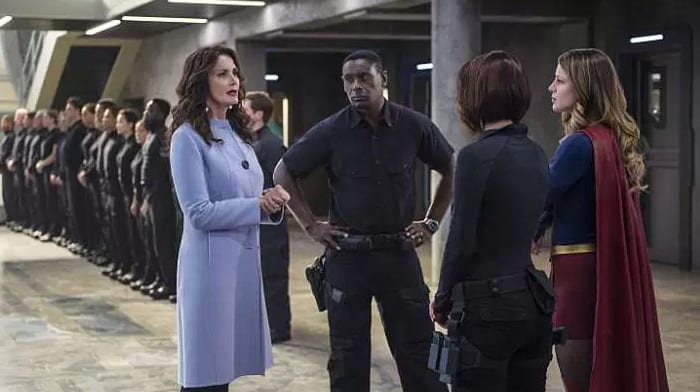
A solid start to the sophomore season, for sure. The focus on alien immigration offered an opportunity to fix some of the weaknesses in S1, especially since the not-so-subtle Trump cipher, Senator Miranda Crane, received justified criticism for being played by a woman of color. Introducing not only more White Martians, in the form of M’gann, but also shifting the anti-alien sentiments to a fringe cell of rogue scientists solved that discomfort reasonably well. The show had set up a situation wherein those in power were fighting for the marginalized while resisting a well funded terror cell run by an intelligent, charismatic, learned fanatic.
As set up by 2A, the theme of alien refugees both played into and subverted the current political situation. The close cultural analogue and potential for commentary was something we’d come to expect from Supergirl in S1. Supergirl has never really been a show to go to for subtle criticism, but we appreciated that about it. Especially because of the anti-immigrant, anti-refugee sentiments we see plastered all over the internet and news sites. A show willing to take that head on and highlight the suffering, fear, and dehumanization that unwanted immigrants and refugees face? Sign us up.
This is part of what made the Martian storyline so compelling. Before we learned of her White Martian status, M’gann and the fighting ring represented the epitome of alien marginalization. She had to literally fight to survive, but under conditions in which she was little more than chattel, an object of violent voyeurism for the privileged humans. The ultimate dehumanization of refugees.
Then her story began to evolve into one of breaking the cycle of violence, freeing herself from her society’s genocidal past, and seeking healing and forgiveness from the people hers had hurt. An important story to tell alongside that of other refugees. Because even those who come from a culture of violence and aggression deserve the chance to start a new life and be better rather than face bigotry and marginalization.
Cultural healing wove into the storyline being set up with Mon-El and Kara. Rather than a culture that directly oppressed and destroyed the other, the conflict between Daxamites and Kryptonians highlighted misunderstanding and unfounded prejudice. This once again added nuance to the refugee narrative, forcing us to accept that even those we don’t like based on cultural differences (rather than hostility) ought to expect to be treated with dignity and respect.
It had the further benefit of creating internal conflict and character motivation for Kara. The first few episodes set up Kara as learning “how to be Kara” this season. We took that to mean she would be exploring who she was outside of being a superhero. Her new job as a reporter was one facet, as was her potential to be a mentor to a new superhero. Having Superman in the first two episodes reminded us that Kara was meant to be his teacher and guide, but her late arrival to Earth prevented this. Not being able to fulfill her ‘mission’ to guide her cousin in his powers and cultural heritage left a hole in Kara’s life. It was literally what she was supposed to do, after all. The introduction of both the Guardian and Mon-El offered Kara two potential new mentees to fill that gap.
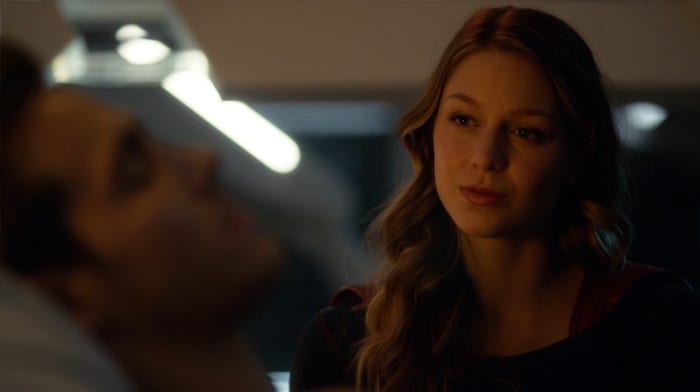
2A also seemed to be setting up an isolation arc for Kara as a means of self-exploration. Alex dropped the truth bomb in 2×02 regarding Clark ‘abandoning’ Kara with the Danvers. Then Kara began to ‘lose’ those closest to her. Alex came out and got a slow burn girlfriend; J’onn was focused on M’gann; Kara broke up with James and he became the Guardian. Cat left CatCo to find herself; Winn left CatCo to work at the DEO and was pulled into helping James. All she had was Mon-El as a hero mentee and her job—two interesting ways to explore “being Kara” as well as potentially addressing issues of abandonment tied to Clark and losing her planet, culture, and family.
Let’s not forget the loss of idealization of her other parent when she learned her dad was involved in building bio-weapons and having to face harsh realities about her culture (vis-a-vis Daxam). That’s one potent cocktail for potential character exploration. Just who is Kara Danvers outside of her superheroism, job, Kryptonian heritage, and all the relationships that had defined her in S1?
The theme of identity tied into the other characters arcs as well. Like Alex discovering her sexuality and J’onn learning to let go of the anger and grief that defined him as a Green Martian. Lena’s, James’s, and Mon-El’s stories dovetailed nicely as an exploration of ‘true heroism’. Each of them, in their own way, provided an angle on the theme from S1 regarding heroism as a choice rather than being a matter of a specific skillset, genetics, or having superpowers. Lena further tied into Kara’s theme of mixed family legacies and M’gann’s of breaking the cycle of abuse and villainy.
Moving into 2B, there were a few threads that do continue. Lena’s mother issues and familial complexities remained a prominent and driving force behind her actions, yet despite her last name, we saw Lena make the heroic decision at each and every turn. She did have a moment of thinking she could trust her mother for the greater good, but that illusion was shattered given Lilian’s willingness (and eagerness) to murder Kara.
James also continued being Guardian, and Kara found out. Then he did Guardian things (when he was given screentime at all) until Cat popped into the final episodes and yelled at him for thinking he needed to do that to be heroic. Took the words out of our mouths.
However, aside from those two side-characters, the focus shifted almost entirely. The Martians plotline was quickly concluded with M’Gann leaving in 2×11 (though she is talked about as J’onn’s off-screen girlfriend in 2×13). Similarly, with the Sanvers slowburn officially blown up in 2×08, Alex’s plotline instead becomes…having a rather ideal girlfriend who she ends up proposing to at the end of the season. Winn is given a thieving, hypersexual girlfriend and works through those bumps.
Yet what’s most striking is the main plot. Prior to the winter break, the driving storyline, like we said, was the alien amnesty plotline, with the xenophobic Cadmus serving as the primary antagonist. While Cadmus certainly existed for the remainder of the season, the central conflict instead morphed into Kara and the people of Earth defending against a Daxamite invasion, with Cadmus mystifyingly fighting alongside our heroes in the finale.
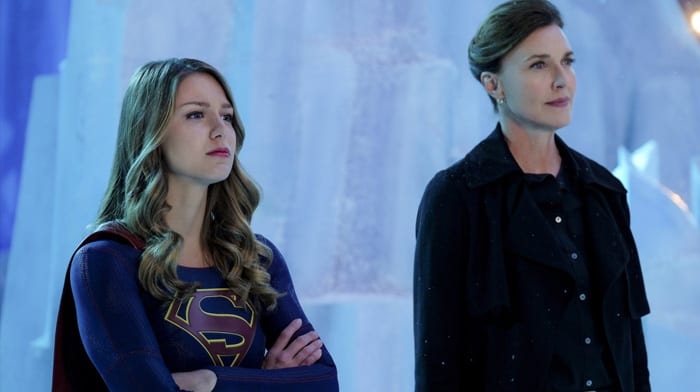
Weirder still, where the driving personal stakes of the 2A plotline had been about Kara’s own alien status, Jeremiah Danvers’s continued imprisonment at the hands of Cadmus, and to a milder degree Lena’s relationship to her mom, 2B relied entirely on Mon-El’s relationship to his mother—a conflict not established in 2A at all.
Kara’s own personal investment came from the fact that she was dating Mon-El, something that apparently needed numerous episodes to explore. As we explained in our previously-linked piece on Mon-El, one of the major reasons why this felt so drawn out was because there was a conflation of Mon-El being hero-ready and boyfriend ready. 2B was heavily characterized by Mon-El learning to be a hero, while also learning how to navigate a relationship, with Kara serving as his instructor with both.
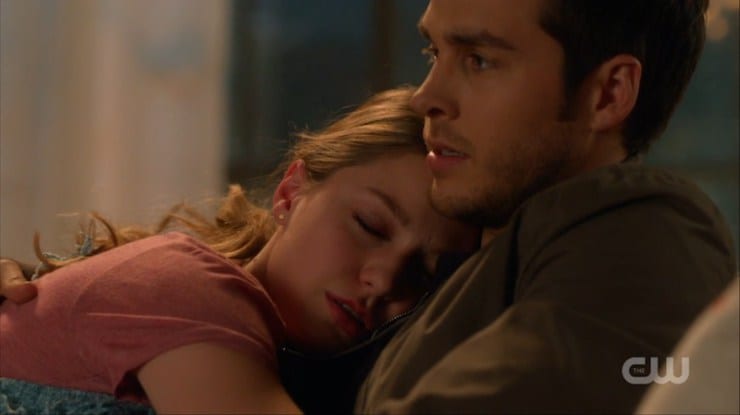
For Kara herself, 2B was not just about mentorship. She also lost her job as a reporter, spent her time in unemployment learning to cook and cuddling her boyfriend, and then got her job back. Then her boyfriend heroically sacrificed himself in a conflict that was entirely about his own legacy. We saw the continued strain on her relationship with Alex through their increased isolation from one another, but nothing overtly (and we stress overtly, rather than implied) addressed this within 2B, so it might have been more of a tone than an intentional thread.
Sitting back after going through that, it’s actually rather hard to sum up the season in its entirety given how disparate some of these pieces were. The best we can come up with is that Cadmus really sucked and was planning something big, but then the Daxamites came and made their point for them, while every character got a love interest. Except James. No one for Gretchen Weiners James.
Nowhere is this more obvious than in 2×14, “Homecoming”, our ‘winner’ for worst episode of the season. It encapsulates everything weak about the season: horrendous pacing, narrative monopolization of Mon-El, lack of lasting character growth or consistency for Kara, backgrounding of James, and the inexplicable and unexplicated rift between Kara and Alex. Kara and Alex were pitted against each other on the one subject they have both always agreed on in the past (Jeremiah/family). We got a lovely Sanvers scene out of it, but at what cost?
Moreover, Cadmus was downgraded as a threat. Not that sending aliens ‘back where they belong’ isn’t a bad thing to do (well…not counting the alien imperialists), but it’s a far cry from the genocide Lillian had planned in “Medusa”. After the narrative conclusion to “Homecoming” in 2×15, Cadmus just kind of…fizzles out as a menace.
Whose Story Was It?
Taking the main plot—fighting Cadmus, then teaming up with them to fight Daxam—as the starting point, we next ask ourselves whose story this was. Now, we admit that while there are times when stories will distinguish between a main character (the character through whom we experience the story) and a protagonist (the character pursuing the story goal), but Supergirl isn’t typically that kind of show. Neither is Flash or Arrow—neither was Smallville for that matter—so this would be quite unexpected in any TV show designed around one hero.
So for the sake of ease, we will assume that the protagonist and main character are one and the same. They will be the character with the highest personal stakes and around whom the main narrative arc revolves.
The most obvious choice would be Kara. She is, after all, the titular character, and this is her show. Yet she does not have the highest personal stakes in either the Cadmus or Daxamite conflict. Others have just as much to lose as she does should Cadmus succeed in destroying all the aliens, and Alex has just as much at stake in rescuing Jeremiah. Her personal relationship with Lillian is contentious, but without the history and weight behind it as Lena’s is.
Every other character is likewise affected by the Daxamite invasion. The only area in which Kara has higher stakes than anyone else is that the primary antagonist, Rhea, is her boyfriend’s mom. But even though Rhea targets Kara due to her relationship to Mon-El, he has ultimately more to lose, and more of a decision to wrestle with, as it is his villainous mother on the loose attempting to invade Earth and set up a New Daxamite regime.
Kara’s not the character moving the plot forward either, not any more than Alex, Lena, or Mon-El. Her journalistic interests certainly tie into Cadmus’s actions, but it isn’t her investigative journalism that unveils Cadmus’s intent or its ties to the Luthor family. The former do themselves and the latter happens primarily through Lena.
Kara’s not the driving force of the Daxamite invasion either. She certain plays a key role in ending the conflict, and is the initial focus of Rhea’s attempts at diplomacy and ensuing rage at their failure. However, Mon-El’s decision to stay on Earth along with Lena’s unwitting involvement in developing the science behind the gate are much more directly tied into the plot. Bringing Daxam to Mon-El rather than Mon-El to Daxam is not, in the end, really a story about Kara at all.
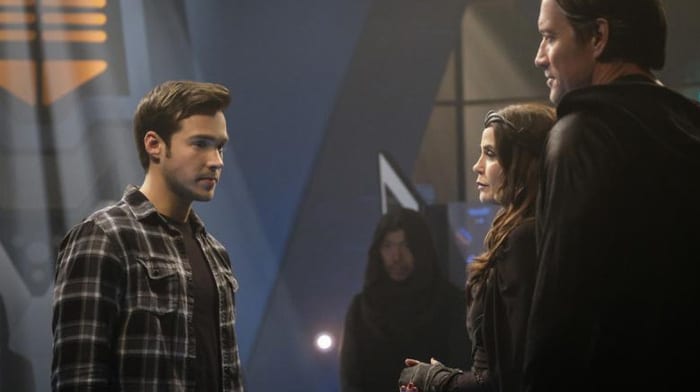
Alex has just as high of stakes in most of the conflicts this season as Kara does and, given the increased prominence of her character development, is a serious contender for protagonist. Rescuing Jeremiah from Cadmus means just as much as to her sister. In fact, she bears the emotional brunt of his betrayal as well as the weight of letting him go afterward. Her actions deal a crippling blow to Cadmus, and she plays a significant role in defeating the Daxamites.
Her character undergoes a significant amount of growth this season as well. She discovers and embraces her sexuality, including coming out to her family and getting a new girlfriend who supports her through the emotional turmoil of Jeremiah’s rescue, betrayal, and disappearance after the downfall of Cadmus. She learns how to be a supportive girlfriend, in turn, even if some of her choices are…strange (who invites their girlfriend’s ex to dinner??). Given how much Season 1 focused on her inability to choose things for herself because of her obligation to protect Kara, ending this season with a proposal marks a significant change for Alex. She’s come into her own and is making a life for herself outside of Kara.
Yet, the Sanvers plot is, for the most part, isolated from Kara and Mon-El’s relationship, arguably one of the biggest arcs of the season in 2B. They parallel each other, but rarely intersect or inform each other. She supports them as they resist Rhea and the Daxamites, but her role is secondary. The Daxamite invasion isn’t ‘about’ Alex at all.
Lena was a character that appeared in a limited number of episodes, yet she is a surprisingly strong contender for the season’s protagonist. She played a vital role off the bat, and was immediately set up as the potential villain to watch, since she’s a Luthor and everyone around her is “genre savvy”. Though she was completely innocent, her mother ran the organization Kara was slotted to go up against, dragging her intimately into the conflict. Time and time again, she chose the side of good and did what she could to help our heroes. Then she developed a professional relationship with the chief Daxamite invader, before being double-crossed by her. In a moment of desperation, she trusted in her mother to help with the situation, only to see that Lillian’s well-intentioned extremism was too far and too compromised for her own moral code.
Lena ended up having a crucial role in resisting the Daxamite invasion, and is set-up into the next season to have continued struggles with her mother, Cadmus, her place in the world, and her own identity.
This is the stuff of a protagonist, really. Yet it’s difficult to consider this season to be “her story” given her limited screentime and given the way that her admittedly high-stakes conflicts were framed as secondary to the “main” fights, namely Rhea vs. Mon-El and Kara. Lena was a unifying force for the season, marrying the Daxamite and Cadmus plots more successfully than anyone else. In that way, we can think of her as support class, or the season’s backbone, which is… Well, we’ve seen this before.
Yet if the “Korra” in this equation was not the protagonist either, who was? To that, we’d need to look at the character that was in the majority of episodes, that had a full arc, and that had inextricable, personal stakes in what ended up being the central conflict of the season: the Daxamite invasion.
Yup. This was Mon-El’s story. You probably didn’t need us to explain that, but beginning in 2B, his arc was the coherent, cohesive one. It was easy to track how he became more heroic—or at least more willing to put himself in dangerous situations and help out—as well as more supportive in his relationship with Kara.
We do feel that sometimes these character jumps were a bit unearned, since from 2×09 to 2×14 he spent the majority of his time arguing with and second guessing Kara, only to be replaced by an incorrigible puppy-dog starting in 2×15. But it is clear that the writers at least thought he had an arc worthy of his heroic sacrifice at the end. In fairness, he was a party boy when we first met him, and it’s hard to think of that Mon-El making the same choice. It’s amazing what happens when you just change the way someone’s written!
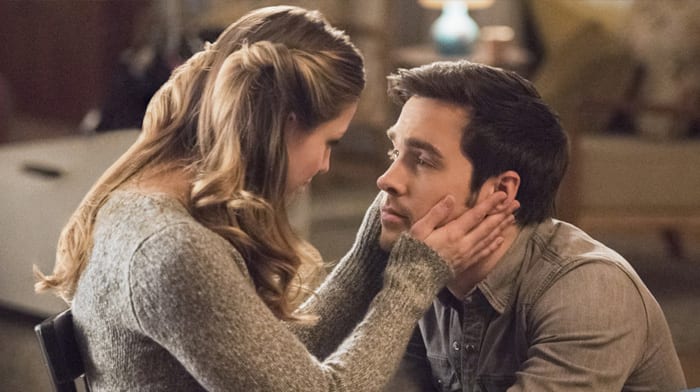
That the conflict ended up being all about Mon-El’s place in the world galaxy, along with his relationship to his mother (and former self), only drives home further how much this was his story. What was his decision regarding leaving Earth? What was his decision with the arranged marriage and his stepping up as a leader? He was the one with the agency to put an end to the conflict, and he…kind of did.
We suppose to make this process of elimination as convincing as possible, we should at least pay lip-service to the only two possible contenders for protagonist left: J’onn and Maggie.
Like Alex, J’onn assists Kara and Mon-El in their fight against Rhea. He gets a lot of screen time and his character has a clear growth arc this season. His forgiveness arc and the mutual healing between him and M’gann is one of the most consistently done and emotionally impactful plots this season. But at the end of the day, it’s a subplot. He’s a great character, for sure. We love Space Dad. He’s just simply not the protagonist; though we would happily watch more episodes featuring J’onn, M’gann, and their team of pacifist White Martians. Someone should get on that.
Maggie was around a good deal during this season, so she seems like a sort of compelling contender. However here’s the thing: take Maggie and throw her out a window in Episode 9. Does anything central to the story change? We suppose Alex could have died in that contrived situation of extreme plot necessity, but forgive us for not finding it reason enough to think of Maggie as the primary actor in the story. She was definitely a supporting character, mostly to Alex, which is fine. She’s a cop, and she wants to protect her city and go on dates with her girlfriend. So she does.
What Was the Result Of the Story?
So now that we understand what story was being told, and who it was about, we can begin to look at the messaging. Why does this matter, and what were the takeaways from a thematic and character perspective? Like most things we talk about around here, we prefer to look at both the Doylist and Watsonian implications. So let’s take those in turn.
Thematic Outcomes
Since we determined that Mon-El is the season’s protagonist, it’s only fair that we first look at the implications of his plotline. And…we’re sad to say that the issues we raised in “Mon-El is Supergirl’s Kryptonite” were not addressed within the season.
To quickly sum this up, our main concern had been the way that Mon-El’s hero journey was foregrounded over any sort of coherent character development for Kara, the person who was supposed to be our protagonist. Given the fact that Kara remained a secondary actor in the primary conflict, this was realized.
We also objected to the way that their relationship was framed as Kara needing to “fix” Mon-El and devote her time into making him a boyfriend-ready hero, since that role is hardly fair for her (and the gendered optics don’t exactly look great). Nor is it positive messaging that men require a women for personal growth. Contextualized against James, Lena, and M’gann, all of whom opted towards heroic roles just because of internal motivation and the fact that it was the right thing to do, it also added an incredibly contrived nature to Mon-El’s arc, only furthering our discomfort at his foregrounding.
Finally, we were shown numerous episodes of Mon-El dismissing and even outright ignoring the things Kara told him, giving us very little understanding of why she was interested in this man romantically at all. She spent many episodes being frustrated and annoyed with him, until one day she wasn’t, and they began dating.
These were our main grievances, and the final episodes of 2B addressed none of them. Mon-El remained the primary actor, Kara never once reflected on her reasons for liking him nor was his former antagonistic behavior ever brought up. Once the show decided that he was at that “heroic point” already, they completely changed his scripting, with him acting like an excitable puppy. There was nothing *wrong* with this behavior, but from a thematic perspective, the messaging is horrific: ignore red flags and sink your time into fixing up a self-centered jerk, because he can end up being a cute boyfriend in the end!
The other side of this is, of course, that love or romantic infatuation will make you heroic. It was most on display with Mon-El and Kara’s relationship, especially in the crossover episode with The Flash, but the fact that they shoehorned in a romance for the already emotionally poignant subplot with J’onn and M’gann furthers this notion. We didn’t need M’gann to have romantic interest in J’onn to understand why she was acting the way that she did, and we really struggle to see what this added to the narrative.
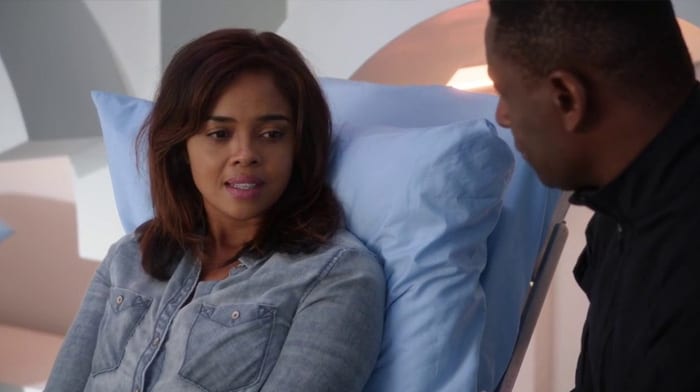
Finally, we would be remiss not to mention our concern regarding the worldbuilding around Daxam, specifically it being a slaving culture, and the way in which this was glossed over in Kara’s interactions with Mon-El leading up to and in the first few weeks of their romantic relationship. While this did become a source of conflict in 2×16, the crossover episode ‘resolved’ this conflict with Kara apologizing for not making Mon-El feel ‘safe’ enough to confess being a Daxamite prince who owned slaves. His history as a slave owner and participation in the slave trade thus ‘resolved’ (if only Kara had been more open-minded!), the topic does not come up again in any impactful way.
From a thematic perspective, we could argue that this plays into the ‘love makes you heroic’ idea. Mon-El learned how to reject his toxic cultural heritage because Kara helped him to become a better person. But given the history of slavery in American society, the way in which the show bandied about slavery as a means of romantic conflict, only to shove it to the side in order to get the protagonist back together with his girlfriend, is insensitive to say the least. Plus, we tend to think that rejecting slavery ought to be done because it’s the right thing and you’re a decent human being rather than because your girlfriend is upset with you. It’s a rather low bar.
Just as unfortunate, and perhaps just as unintentionally problematic too, is how 2B changes the theme of alien amnesty. As we discussed above, 2A seemed to be setting up a pretty thorough critique of anti-immigration rhetoric vis-a-vis Cadmus’s anti-alien bigotry. Lillian’s willingness to kill all the aliens in National City because ‘Earth is for humans’ places her clearly in the wrong. Characters like M’gann and Mon-El were meant to remind us that we must accept immigrants and refugees on their own terms rather than persecute or reject them out of blind prejudice. Assuming all aliens are violent and need to be kept out is hyperbolic and xenophobic.
The only problem? 2B flushed that all down the toilet when it made the main antagonist of the season a violent, aggressively colonialist alien who sought to invade Earth and enslave humanity. Let’s not forget her killing her husband, imprisoning her son, and trying to murder his girlfriend multiple times too. One could reasonably conclude from the narrative that if Lillian had succeeded in exiling all the aliens, including Mon-El, the Daxamite invasion would never have happened.
More significantly from a thematic perspective is that in the end, Cadmus was right. Aliens are violent. Even aliens that don’t want to be violent can be manipulated into being so against their will. Aliens also want to invade Earth and the characters are justified in using extreme measures to keep them out. Sure, all the aliens in “Exodus” didn’t deserve to be sent away, and Roulette’s underground fighting ring was pretty shitty. But that’s going to pale in comparison to the literal alien invasion at the climax of the season. 2A just ends up looking like a #NotAllAliens footnote to a season dominated by aliens doing exactly what was meant to be hyperbolic extremism in 2A.
As horrifying as that take-away is, there are some results of the season that were quite positive and uplifting. While the Daxamite invasion may have inadvertently made Cadmus’s point, it also was framed around Mon-El’s duty to his family and home vs. duty to the Earth. This has its own issues, but it fit perfectly well with the idea that you get to determine your own legacy. Mon-El made that choice and for the side of good, as did Lena—over and over, actually, even if the music (and marketing) sometimes likes to pretend that she’s evil. James struggled to shape his legacy and chose Guardian as his outlet to be the hero he wanted, while M’gann chose her own destiny against the desires and actions of the White Martians.
We love this, and only wish the Danvers sisters had been able to take part as well. It seemed like Alex was going to for a hot minute with Jeremiah’s reappearance. Kara, too, was certainly set up for a similar arc given that the season started with Clark in town and Alex actually pointing out that Kara was abandoned by him. Mon-El was poised to be the guy she could finally mentor in the way she had always meant to with Clark, and her professional career as Kara Danvers received some attention. However, nothing that happened to either Kara or Alex in the conclusion of 2B had anything to do with this.

There were other positive themes as well, such as the exploration into breaking the cycle of violence and abuse. As much as Mon-El’s arc weakens due to the sloppy handling of slavery, M’gann and Lena showcased it near perfectly.
M’gann rejects her culture’s heritage of genocide, and without having to do so primarily because of her romantic interest in J’onn. M’gann’s journey dives into the difficulty inherent in leaving one’s culture behind due to ideological differences. Whether it be the betrayal and killing of her spouse, the vivid and traumatizing flashbacks, or potentially losing the respect and friendship of someone she cares about, M’gann faces real consequences for her choice to break free. The narrative never justifies her culture or glosses over the horrors it inflicted in an attempt to make her look better by comparison. And when she turns around to try and enact cultural change, she leaves because it’s the right thing to do, and not because she would die if she stayed.
In a somewhat similar vein to M’gann, Lena spends the entirety of the season resisting her mother’s temptations to ‘give in’ to her family legacy of villainy. Time and again she chooses instead to break free of her mother’s emotional manipulation and be her own hero. Even when the whole city is against her just because of her last name, she refuses to be who people expect her to be. She wants a different legacy from her family’s, to not “be a Luthor”. It’s the reason she came to National City, and the reason she continues to choose heroism over her family. As two women with emotionally abusive mothers, Lena’s story has a lot of emotional resonance, and we’re grateful for it.
Now that we write this down, we’re kind of scratching our heads at why this wasn’t what we got with Mon-El. Given the thematic parallels between M’gann, Lena, and Mon-El, it’s rather odd that his story ended up being so different from theirs. More emphasis on what Lena and Mon-El had in common re: their mothers, for example, could have been really compelling to see fleshed out, especially if it had been highlighted instead of slavery.
Speaking of mothers, the choice to include Rhea as a villain alongside Lillian has the side effect of…well, villainizing mothers. Now, we’re pretty sure this is unintentional. Chances are, it’s a side effect of the desire both to have powerful female antagonists and to explore family and legacy. And having two villains who happen to be mothers isn’t entirely a bad thing, either. A lot of people have bad moms or complicated relationships with their mothers, so in theory, it’s worth exploring this dynamic.
The results, however, are mixed. Lillian isn’t a villain because she’s a mother. Take away her relationship with Lena, and she’s still a xenophobic attempted mass murderer. Take away Cadmus…and she’s still an emotionally abusive mother to Lena. This is an excellent way to explore the intersection of abuse and extremist ideology.
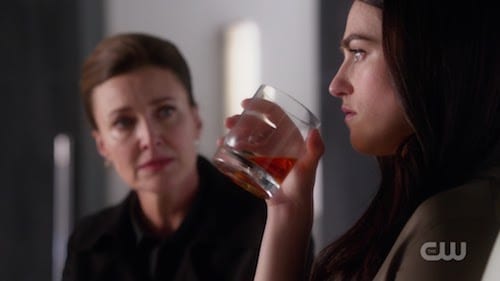
Rhea, on the other hand, is a villain precisely because she’s a mother. Take away the invasion and husband-cide and she’s still a manipulative mother to Mon-El. But take away her motherhood, and, well, she has no motivation to do anything. She lacks Lillian’s nuance, becoming weaponized Motherhood to the extreme. Moms really are just The Worst™, right? Well, except for Eliza. Too bad she didn’t get much screentime to balance out the mom-negativity.
Character Outcomes
From a Doylist perspective that’s some mixed messaging. And we’re of the mind that the audience takeaways are what count the most, since these characters are, you know, fictional. Stories matter because the people who consume them experience something through them.
That said, there is also value in looking at the story as its own artform, especially because the character journeys, no matter how horrendous the implications, can give us insight into what the writers were trying to accomplish. For most characters, the results of their story were rather obvious, since they had clearly defined arcs, like we’ve detailed with Lena, Mon-El, J’onn/M’gann, and to a degree, James. However, we want to zoom in on Kara and Alex specifically since they are a) supposed to be our protagonist and deuteragonist, respectively, and b) had arcs that were difficult to track.
Let’s start with Kara. We were told going into this season that it would be about exploring who Kara was as a person outside of her role as Supergirl. Benoist said of Cat’s decision at the end of last season to let Kara choose any job she wanted at CatCo:
“It gives her a bigger purpose outside of being Supergirl… I think that’s important for her personal life, her career, and her heroics kind of have their own purpose in her life.” —Melissa Benoist
2×01 sets this up with Kara’s decision to become a reporter and break up with James, a decision that stemmed from her self-professed desire to “figure out out how to be Kara.” By the end of 2×08, everything was in place for Kara to explore who she is outside of her role as superhero: a new job as a reporter with a boss who demands she prove herself, no romantic relationship to distract her, a sister happily in a relationship of her own, and a potential mentee to take the place of her cousin.
In 2B, Kara gets a new, different romantic interest and the question becomes: can Kara “have it all” and be a superhero? Not precisely the same question as “who is Kara Danvers”, but not a bad one either. A lot of women in our society struggle with the same question.
Only, the “maybe I can have it all” mentality ends up with her losing her job and determining that being Supergirl and having a boyfriend was ‘enough’…immediately after she’d just confessed that her job was an intrinsic part of her identity. She then gains her job back and loses her boyfriend. Her relationship to Jeremiah and her father matter until they don’t, with no lasting narrative impact. Her tension with Alex spans most of the season, but the resolution is never verbally explicated on screen (White Martian!Alex doesn’t count). They just kind of…return to status quo. Basically, she ends the season where she started—job and support network intact, kissing her boyfriend goodbye.
Can we take a minute to discuss Kara’s professional career? See, one of the inescapable takeaways was that journalists have a duty to tell the truth in a credible way. We love that Snapper was given the platform to say this, especially in today’s cultural context, where the role of news media is continually demeaned and disparaged. However, the writing team made the mystifying decision not to have Kara react to being unemployed past learning to cook, and then randomly seeming bored in the one episode, the same one where this thread was resolved. We learn there that Kara has still been reporting from KaraDanvers.com (who would read this?), presumably the entire time since she was canned, but we were never shown it. Then Snapper hired her back because her hunch about one story was correct.
On a thematic level, we can’t make heads or tails of this. It undercut Snapper’s original point, and given that Supergirl Season 2 was supposed to be about exploring who Kara is when she’s not Supergirl, it was a spectacular failure. Sure, she seemed to be happy that she had her job back, but she also was perfectly content to be unemployed. Hell, she only became a reporter in the first place because Lena said that she seemed like a good one. Are we supposed to view this recent season and believe this is what someone who’s found their calling looks like?
What the hell is this supposed to mean for Kara’s character? That she just *is* a natural reporter because she was right about this one case? That she has a deeply inquisitive nature that lent herself to this (not really in evidence anywhere else, unlike say, Lois Lane)? That she really does need her cousin’s trailblazing as a scaffolding for how she should live her life?
This just…it wasn’t character development. We suppose being very generous we could say that she now knows not to release unsourced information to the public using a website with her full name as the URL. But in a full season of television, we kind of expect more for our main character.
Even moving off of her career, what did she learn? She patiently molded Mon-El into a halfway decent boyfriend, and then said goodbye to him when circumstances that saved her planet required him to leave in order to keep himself alive. This isn’t an arc, it’s “my crazy summer fling.”
So…we guess she learned she can’t have it all, if ‘have it all’ means having a job, boyfriend, and strong support network of friends and family? Somehow, we’re not sure that’s what they intended. And it still isn’t the same thing as figuring out who Kara is outside of being a Superhero. Because she didn’t really do that. Like, at all. Her job matters until it doesn’t, until it does again. Her boyfriend (James) matters, until he doesn’t, until a (different) boyfriend matters. Kara stands up for herself, only to accept negative behavior from Mon-El, only to stand up for herself, only to accept the same behavior. You get the idea.
Kara lacks a cohesive character arc and identity the entire season, and none of it actually resolves by the end. So the answer to the question “who is Kara Danvers” ends up being: whoever the plot demands her to be.
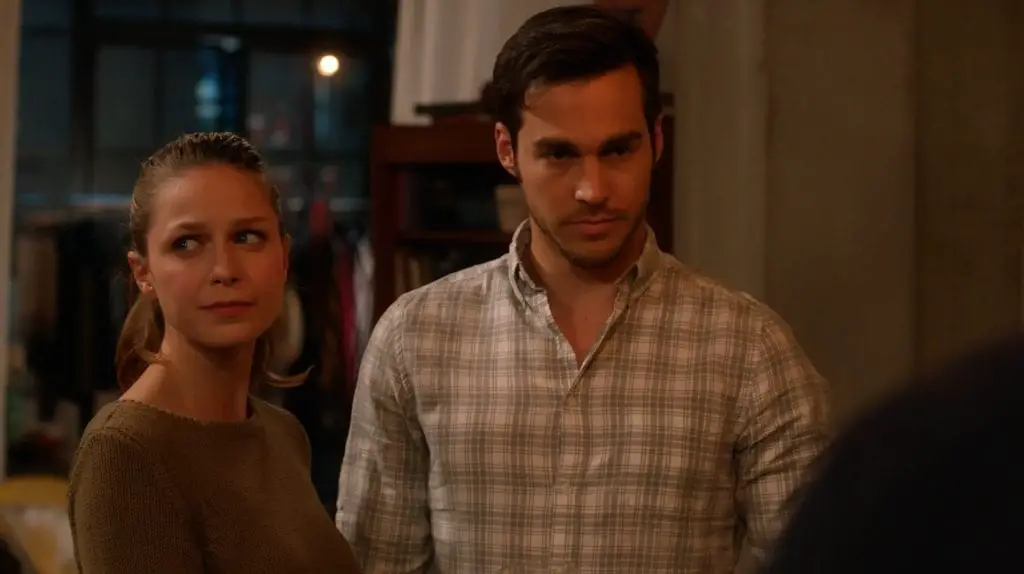
And yes, Kara prioritized saving the world over continuing her relationship with Mon-El, which is a rather stock hero-trope, and supposedly selfless enough that Superman claimed he wouldn’t have gone through with it. We just don’t see how anything in the season was particularly necessary to get Kara to that point, especially when at the end of last year, Kara was not only willing to, but willingly sacrificed her own life in order to save her planet (only for Alex to save her because sister OTP is the only OTP). Breakups are tough, we know, but death or the enslavement of her planet might be a tiny bit worse. If the idea was that Mon-El was especially hard on her because she was isolated from the other people she loves this year, most notably Alex, a single explicit mention of this tension would have been nice. Dare we even say, required.
That’s the real kicker: even though the typical Danvers sisters closing-scenes were replaced by “Karamel” and “Sanvers” moments, any distance between Kara and Alex wasn’t recognized by the narrative in 2B. There was the episode where Alex wanted to go to a concert with her girlfriend and Kara wanted to celebrate the anniversary of her arrival on Earth with her sister, but the conclusion reached was that Kara was only overcompensating because she was repressing feelings for Mon-El. (What?) Which, given that they got together, we assume was supposed to be taken at face value. When Alex first came out to Kara, there were a few scenes where Kara wasn’t responding in as supportive a manner as Alex needed, but that got hammered out as well, as it should have. Other than those instances, they’d both rush to save each other like always, just never spend time around each other outside of it.
A big part of this is Alex’s driving storyline: she has a girlfriend now. As we mentioned, 2A had originally teased a “Sanvers Slowburn,” only for Maggie to leap to the conclusion that life’s too short to have reasonable hesitations about jumping into a relationship with a 30-something who just figured out her sexuality. Which is a fine conclusion to come to, by the way. Being someone’s first is intense and the rate of success isn’t heartening, but it’s also not exactly unrealistic that two people who really, really like each other would want to pursue that against their better judgements.
However as a result of that, what we were left with was Alex and Maggie just…being in a relationship together. And we will totally take this over the string of wlw corpses that’s filled our TV screens lately, no question. It’s just that as time went on, there was an element to the way their relationship was portrayed that felt quite sanitized to us.
We appreciated Maggie’s backstory, especially because we’re fans of Renee Montoya, but then nothing was really *done* with that, or Maggie’s character, or the Sanvers relationship at large. Any fight or conflict would get resolved right away, even situations that veered into ridiculous territory, like Alex inviting an ex of Maggie’s on the spot to dinner, and then learning that Maggie had been a serial cheater for a time. Oh well, we all have problems.
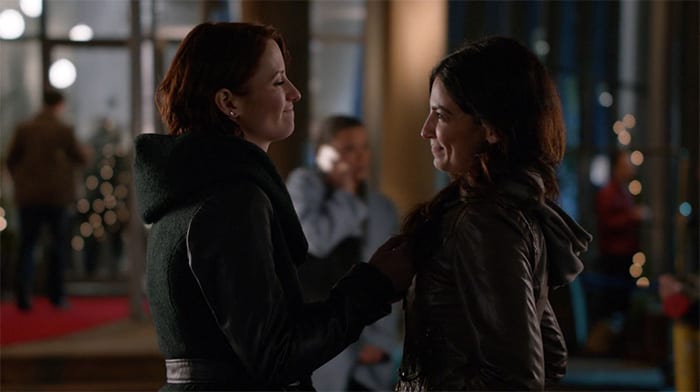
It’s maybe an ineffable line between happy, positive representation and Closer to Earth, but there was just something about the way Maggie would say “ride or die” in a situation that by all rights should have cost them both their jobs without asking a single follow-up question first that felt to us, quite a good deal unrealistic. We appreciate the value of Sanvers as aspirational, even if we would argue that good partners should challenge one another, but we can’t say we’re particularly compelled by it. And this was a relationship that we started out absolutely loving!
Perhaps if the season hadn’t ended with a proposal, this would have been passable, but really, that was such a perfect moment to embody all of our issues. It is ridiculous that these two would be considering marriage this early on, when Maggie’s canonical reason for her hesitation in dating Alex was that she was worried that by being Alex’s first woman, she’d be viewed in an overly idealistic light and Alex would get too swept up by the new, overwhelming emotions. We’re deeply hoping that Season 3 opens with Maggie making a “marry me!” Arrested Development joke and awkwardly finger-snapping out the door. (Oops, busted!)

Alex’s other driving motivation, especially given the big reveal last season that Jeremiah was alive, ought to have been rescuing him from Cadmus. We say ‘ought to’ because aside from a handful of moments, both Kara and Alex seem to have forgotten that their father had been kidnapped, held hostage, and for all they know gruesomely tortured by a splinter cell of scientific terrorists for ten years.
We can understand that for most of 2A, Alex had other things on her mind, namely, figuring out that she’d sublimated and repressed her attraction to women all of her life in order to better take care of Kara. That’s a pressing psychological conflict. Yet even then 2×07 seems poised to bring Jeremiah’s plight back into Alex’s life. Only for him to literally disappear from the narrative until 2×14 and 2×15, whereupon he once again disappears, and is only given cursory mention in 2×19 and 2×21.
His choice not to go with Kara and Mon-El in 2×07 is not well explicated, nor is his sudden disappearance in 2×15. This leaves us with the impression that he’s merely an afterthought in the narrative until Cadmus is plot-relevant, rather than being tied to Alex’s (or Kara’s) character arc. He leaves no lasting emotional scars either of the times he shows up and disappears. And we’re sorry, but with how significant 2×14 made his betrayal of Alex out to be and her decision to let him go, not teasing out how his third (fourth?) disappearance would affect her makes no sense. Given the prominence Jeremiah had in Alex’s arc in S1, his absence from her storyline in most of S2 baffles us. Outside of her realization about her sexuality, this ought to have been one of the biggest emotional journeys for Alex, but it wasn’t. Until it was for drama, until it wasn’t again.
Misaligned Intent and Result
It’s always a little difficult to guess at authorial intent, since we didn’t have the privilege of being in the writers’ room when the season was planned. However, the final two episode titles give us a hint at the kind of story the writers thought they told in Season 2.
“Resist” and “Nevertheless, She Persisted” are not even remotely subtle allusions to our current political climate, and phrases associated with more progressive voices. It seems fair to assume the idea behind this was that Supergirl’s second season offered a narrative that could give hope to those that stand against Trump’s agenda, or perhaps validation, because somehow we doubt that they just wanted to quote Mitch McConnell uncritically.
There’s also the inextricable link between Elizabeth Warren’s admonishment (or accidental praise, really) and the general concept of female empowerment tied into this. Think the statue of the young girl in front of the Wall Street bull, or all the signs saying “a woman’s place is in the resistance.” Like Pepsi, Supergirl was trying to tap into our current cultural zeitgeist to evoke that empowerment. And like Pepsi, the overall result was absolutely cringe-inducing.
What did Kara resist to earn such an episode title? What did she persist through, exactly? As far as we remember, her boyfriend’s mom decided to invade Earth because her boyfriend wouldn’t come home with her, and she punched the appropriate things that needed punching. In fact, the way Rhea pulled out all stops, tried every single approach, and manipulated multiple individuals make the words apply better to her. Her husband showed weakness so she killed him. Now that’s what I call resistance!
Were the episode titles supposed to apply to Lena? Because they certainly do, given her role as hostage in the penultimate episode, and her creation of the lead-dispensing device to save the world in the finale. Or how about Cat? She showed up and resisted the god-awful character arcs by yelling at James about how he didn’t need to be Guardian and motivating Kara into action, and hopefully will be persisting into next season as the leader of CatCo (come on, Calista, work with us!).

But, we’re saying this tongue-in-cheek because we know fully well the episode titles are supposed to be about the titular protagonist and the main plotline. That’s just how things work.
We simply don’t see the feminist takeaways there. It’s the story of a woman who patiently prodded a selfish, uninspiring man into being heroic so that they could date, even when he violated her boundaries and refused to listen to her. Then she had to face off against alien invaders, proving the xenophobic point that her former antagonists had made. Please tell us who this empowers. We’ll wait.
While we’re on the subject of dating, one would expect—given a season that featured two mothers as the antagonists, and adoptive sisters and their Space Dad as the heroes—family would be central. This was undeniably the case in S1, which featured Kara sacrificing herself to save the world from her uncle after the death of her aunt, both of whom were reacting to actions taken by Kara’s mother, only to have Kara rescued by her sister. It was, unmistakably, a family drama that evoked Kara’s potentially divided loyalties between her blood family and her found family. The inclusion of Lena and Lillian Luthor as well as Mon-El and Rhea, appears very much in that vein.
But was it? The main source of conflict for Kara was in her romantic relationship. Alex’s plot revolved around her coming out and getting a supportive girlfriend. We pointed out above how literally all of the main characters got a romantic partner except James. With the exception of J’onn—whose arc becomes romantic only after the tension has resolved and M’gann leaves—and Lena—who has one episode of romantic conflict and the rest is about her mother—these romantic pairings were the driving force of each of their arcs this season. The final climactic moment of the season is Kara and Mon-El breaking up after a season of ‘doomed romance’.
Kara losing Mon-El is just The Worst Thing Ever™, right? Just like J’onn ‘losing’ M’gann for part of the season, or Maggie almost losing Alex when a crazed former classmate became a Villain Sue and kidnapped her. Or Mon-El making the choice to leave Kara after Kara broke up with him for the greater good. All the high stakes moments this season stemmed from romantic relationships rather than familial ones. Heck, Maggie even says that her relationship to Alex means just as much as Kara’s to Alex.
Maggie: I did what I thought was right I should have been heard. I should have been listened to. I’m her girlfriend.
Kara: I’m her sister!
Maggie: And you think that trumps me. That you know what’s right for her. I got her to be herself, Kara. I have just as much to lose as you. You should’ve listened to me.
We’re at a loss for how this makes sense at all. Maggie and Alex have been dating for, what, two months? Alex and Kara have been everything to each other for years. The only world in which Maggie’s statements make sense is one in which romance is just as, if not more important than family.
Now, that’s not an uncommon theme on other shows; The CW kind of is a juggernaut for that mentality. But it’s not what Supergirl has been about in the past. Found family more than romance was the driving source of support and love in S1. This season, all that went out the window in order to give everyone but James ‘somebody to love’. The end result is the break up of compelling friendships and found family bonds and a message that what you really need is the ‘right’ romantic partner, and the willingness to give them up if it’s the only way to keep them alive. In what way is this ‘Stronger Together’?
Where Do We Go From Here?
We can hear ourselves getting quite negative, but this really does seem to be one of those seasons where the longer you think about it, the worse it gets. What frustrates us is that this is a show we both loved as of 7 months ago, and one where we find a lot of potential, just given the inherent nature of who Kara Danvers is as a hero. Therefore, we humbly submit the following as suggestions that could markedly improve Season 3.
1) Give Kara an Arc
Above everything, give Kara Danvers a character arc. That the titular character finished the season with no real arc to speak of and didn’t even serve as the protagonist of her own show. This should not happen. 2A set up strong potential for an arc exploring Kara outside of being a Superhero, and we would like to see that explored since it didn’t get the focus it deserved.
This could mean letting her truly explore what about being a reporter fulfills her. Or if not that, discovering a different career that allows her to help people outside of being a superpowered alien. Let her struggle with her ‘humanity’, her ‘ordinariness’, and yes, even losing her romantic partner. Let her be something more than a superhero who punches things (sigh). In fact, we’d like our old Kara back, the one who talked people down first instead of rushing in to punch things and flaunt local authority. Just, let Kara be a person first, superhero second.
We know from information dropped in the past few weeks that season 3 will include a storyline about her parents and the legacy of Krypton. We hope this will be used to explore Kara Zor-El outside of Supergirl. Perhaps wrestling once again with the mixed legacy her parents have left her and what that means for her as one of the last children of Krypton? We’re big fans of cultural baggage, mixed legacies, and complicated family dynamics, and are definitely on board if that becomes a central focus for Kara moving forward.
2.) Flesh out Maggie Sawyer
We do know that Floriana Lima is going to have her role dialed back for next season, though she still is slated to appear in a number of episodes. We actually like this idea, since we think her more parsimonious use could force the writers into focusing on her and what would be driving her when she does show up, rather than falling back on the Girlfriend McFace pattern we were beginning to see towards the end of Season 2.
Perhaps our tepid feelings about Maggie do stem from the fact that we’re projecting some Renee Montoya onto her. But the truth is, despite the backstory we got, Maggie feels like a blank slate. We think part of that is her inconsistent behavior; how she talked about relationships blowing up before to the point where she had sworn off humans sits in contention a bit with her being a cheater in her past. To us, it made more sense given her guarded approach to Alex if she had been the one getting hurt over and over. Add to this the proposal, which should create friction between them given Maggie’s hesitation, yet we’d be shocked if they actually went in that direction.
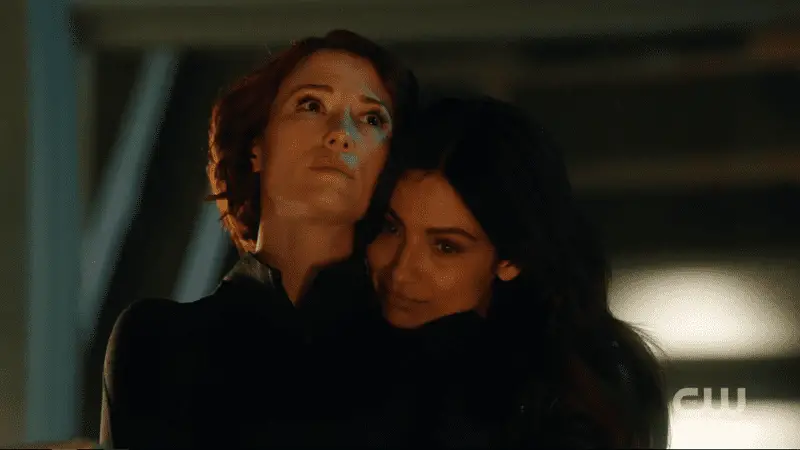
But they still need to take her in some direction. A leather jacket and smirk don’t make a character. We might be spoiled because of how amazingly defined and rounded Waverly Earp’s cop girlfriend, Nicole Haught, is in Wynonna Earp. It’s a high bar, no doubt, but if some campy summer show can do it, then one of The CW’s major fall pieces should be up to the challenge. #MakeMaggieACharacter
3.) Focus on Kara + Alex More
We love shows that front sibling dynamics, especially if the siblings in question happen to be sisters. The bond between Kara and Alex is, hands down, the heart and soul of this show. Or it was in S1, but this season, the show merely mimicked the action beats of S1 without providing the emotional core of sisterly love and support. Kara rescuing Alex ought to be the culmination rather than the entire content of her unconditional love for her sister.
Support through romantic partners is nice, and for many people in real life that is their primary source of support. But we still want to see Kara and Alex supporting each other through the most difficult situations they face. The fact that we didn’t get Kara and Alex comforting each other after Jeremiah betrayed them is unpardonable. Support in a romantic partner need not exclude or be in tension with support through their sister-bond, especially not sisters as invested in each other’s lives as Kara and Alex are.
We want couch cuddling, pizza nights, and sister dates with potstickers and TV. We want more of Kara and Alex gushing to each other about who they’re interested in and why, or eye rolling about That Thing™ Maggie did that drives Alex crazy, but Kara reminds Alex she loves Maggie anyway. Or Kara confiding her grief over Mon-El with Alex, and Alex not making it about Maggie. Basically, we want Supergirl to get back to the relationship that provided the emotional strength, balance, core, and backbone in S1: the Danvers sisters. Because this is at heart, a show about two sisters taking a stand together against the evils of the world.
4.) Make James the Male Lead (Again)
James Olsen was the undeniable male lead in S1, and the “Karaolsen” mutual pining the central romantic subplot. He wasn’t a perfect person or character; like all good characters, he had his flaws. We’ll even admit he had his moments of uncomfortable entitlement where Kara was concerned. At the same time, he was a kind, supportive person to Kara outside of their romantic tension; he believed in her as a hero, and she inspired him to be better.
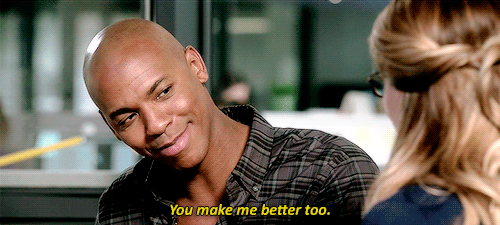
We had our hesitations regarding the Guardian story line from a character perspective, not least of which being that it felt almost entirely unmotivated, or at least, unreasonably motivated. But the Doylist implications exacerbated the problems exponentially. James went from being the male lead to barely a tertiary character. Mon-El, a bland, selfish, and entitled white character displaced James as Kara’s romantic interest with zero professed interest on Kara’s side and little to recommend him on Mon-El’s side. Compared to James’ charismatic and supportive friendship, Mon-El’s refusal to listen to Kara seems an…odd basis for a romantic relationship.
But enough about Mon-El, let’s talk about what James could do in S3. With Cat Grant effectively giving him the stern talking to he needed since 2×04, James could be poised to finally take up the mantle at CatCo that he ought to have been carrying this whole season. If Ms. Grant does not return, James could lead CatCo and once again make it plot relevant, which would dovetail nicely with a return to focusing on Kara’s job outside of being Supergirl.
While we’re dreaming of nice things, why not restart Karolsen? After an appropriate amount of space for Kara to grieve Mon-El and refocus on her job, of course. As much as we’d love a Korrasami 2.0, we sincerely doubt the show will follow those bread crumbs, even when there’s enough of them to make a full loaf at this point. So if not that, we would love to see Kara back with the man she spent an entire season pining over before dropping like a hot potato for…reasons?
5.) Use Lena Luthor All the Time
Is it worth talking about those bread crumbs, though? We fully admit that Supercorp is more something where we see potential, but expect no payoff, even if it matches our own personal shipping taste.
The thing is, a large part of our enthusiasm for that romantic pairing comes from the strength of Lena’s character. It was almost uncanny; even through 2B’s slog of episodes, the second Lena would appear in one, the show would become measurably better. This could have been a result of Lena accidentally serving as the season’s bridge between Cadmus and the Daxamite invasion, so her plotline with her mother and struggle to run L-Corp against her family’s infamous reputation automatically roped back in threads that otherwise could have been dropped.
However, we think our main excitement stemmed from the fact that Lena is an incredibly complementary foil to Kara. Both women deal with their concept of legacy and making their own name, yet where Kara lost her parents and found a new, loving home, Lena was brought in by the Luthors where she was never made to feel comfortable, only to learn that they were monsters. Skill-wise, they’re nearly complete opposites, balancing and empowering each other in crisis situations (like Lena building the solution to the Daxamite invasion and Kara dispensing it). Lena is more comfortable wading into the darkness and moral ambiguity of a situation, while Kara remains the steadfast voice of hope, though both share an equal commitment to justice and unwavering support of one another.
Truly, they’re perfect together, and we don’t give a hot wet monkey’s ass if their relationship remains platonic. We just want it to continue and to watch it grow (in positive directions).
6.) More Martians
Second to Lena, the Martians had the most compelling arc this season to us. The arrival of more White Martians to join M’gann and J’onn means there’s space to expand their role in the coming season, and we think acclimatizing refugees from a genocidal culture would make for mighty fine television. It could have the added benefit of responding to and correcting the mistakes made with the alien refugee subplot this season. As M’gann directly responded to issues raised with Senator Crane, so M’gann, J’onn, and the White Martians could respond to proving Cadmus right with the alien invasion.
We’d also like to see M’gann have more screentime generally and interact more with the other characters. She has a lot in common with Lena and Winn (two characters we’d like to see interacting more anyway), for example. And if Kara does explore her mixed Kryptonian legacy, M’gann is the perfect person to talk to about that. She could bond with James over not knowing one’s purpose. With abilities similar to J’onn, she could be a huge asset to the DEO team. Or, if she takes up the mantle of barkeep once again, she also has the potential to be a source of wisdom and emotional insight for the team. We’ll take mom friend M’gann, Space Dad J’onn, and their White Martian refugee children, please and thank you.
7.) Fix Distracting Worldbuilding Flaws and Lazy Plotholes
Look, we understand that Supergirl isn’t trying to be Breaking Bad, nor should it. However, when basic plotlines fall apart with such a minimal amount of scrutiny that we can’t even finish the episode without leaping to the holes, that’s a problem.
Take the Daxamite invasion, ended by lead being released into the atmosphere. What was this magical amount of lead that would not have poisoned the entire human population? Why was Mon-El not dead the instant he walked into the lead-lined DEO? Is Kara’s superhuman sight now hampered? Is there a reason why lead bullets weren’t employed instead of contaminating the entire atmosphere? And don’t get us started on Rhea’s magical Kryptonite infusion that Kara only suddenly realized…
The issue is, that wasn’t an isolated contrivance. Season 2 was chock-full of them. From Alex’s stupidly omniscient stalker who managed to take down a fully trained DEO agent before trapping her in the most ridiculous Xanatos Gambit we’ve seen in some time, to the entirety of the DEO missing the fact that Jeremiah Danvers, an agent who had been captured for *decades*, had a goddamn robot arm.
And since we’re on our favorite government agency, the sloppy writing permeates the world building as well. Kylie and Griffin spent a painstaking amount of time trying to explain the very basics of its operation and came up quite short (unless you’re compelled by DEO agents running a fake hotel). However, we refuse to believe that such an organization would fail to have any sort of protocol regarding potentially compromised agents. Just as they wouldn’t have sloppy security screening that allows anyone’s girlfriend to walk in, such a poorly staffed tech department that Winn serves all their Techno Wizard needs (what did they do in Season 1?), and days off in the middle of an alien amnesty crisis.
The National City Police Department isn’t a whole hell of a lot better. Maggie will have a partner in the episode where she’s in charge of art thefts, for some reason, but then get back onto her homicide cases flying solo. There’s procedures! If you’re going to riff off of Renee Montoya’s character, at least read a damn copy of Gotham Central first.
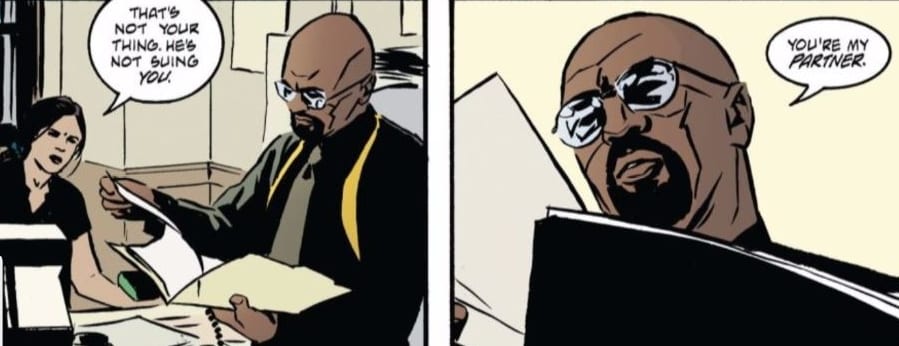
It was also passing disturbing that Maggie mentioned how her Partner of Plot Convenience was about to make Winn his 30th arrest of the month and pass a station record. How much crime is in this city, exactly? This is one station of a major city! What is going on there? Why has the National Guard not been called in yet? Or are all these arrests related to art theft? We’d like to see a show about that crime ring.
We know that these are smaller issues, but when they add up, we find it impossible to suspend our disbelief. The easiest thing a writer can do is ask themselves “but why?” over and over again when plotting; it’s the ‘5-year-old in a corner’ principle. If the only answer they can come up is, “because this character is being an idiot,” then that’s not a strong story.
Up, Up, and Adler Away
Will we get all of this? Maybe. Probably not. But at least the first three would go a long way toward fixing some of the major flaws this season. No matter what, Kara needs a discernable arc, hands down. We’d be lying if we said the recent shakeup in leadership and writing team doesn’t concern us. Ali Adler was a leading voice behind much of the sharp political and feminist commentary of S1, and she was, so far as we’re aware, the only queer woman on the writing team. CBS’s gain is Supergirl’s loss, and we have our theories about what the marked shift between 2A and 2B means for what was going on behind the scenes.
Then again, sophomore slumps aren’t that unheard of. Wynonna Earp and Black Sails seem to be the exceptions that prove the rule. And if there’s a shakeup in the leadership in the middle of a season, that can cause ripple effects in the narrative that might otherwise not have happened. Moreover, many shows with a rocky second season even go on to have more successful seasons further down the road. And a good second season doesn’t always mean you’ll get a decent third, fourth, or fifth season.
All that to say, this isn’t over yet. This is fixable. Kara would want us to have hope, after all.

